A college degree may be the most effective form of birth control
First comes love, then comes marriage, then comes … actually reverse that. First comes the baby, then, we’ll see.
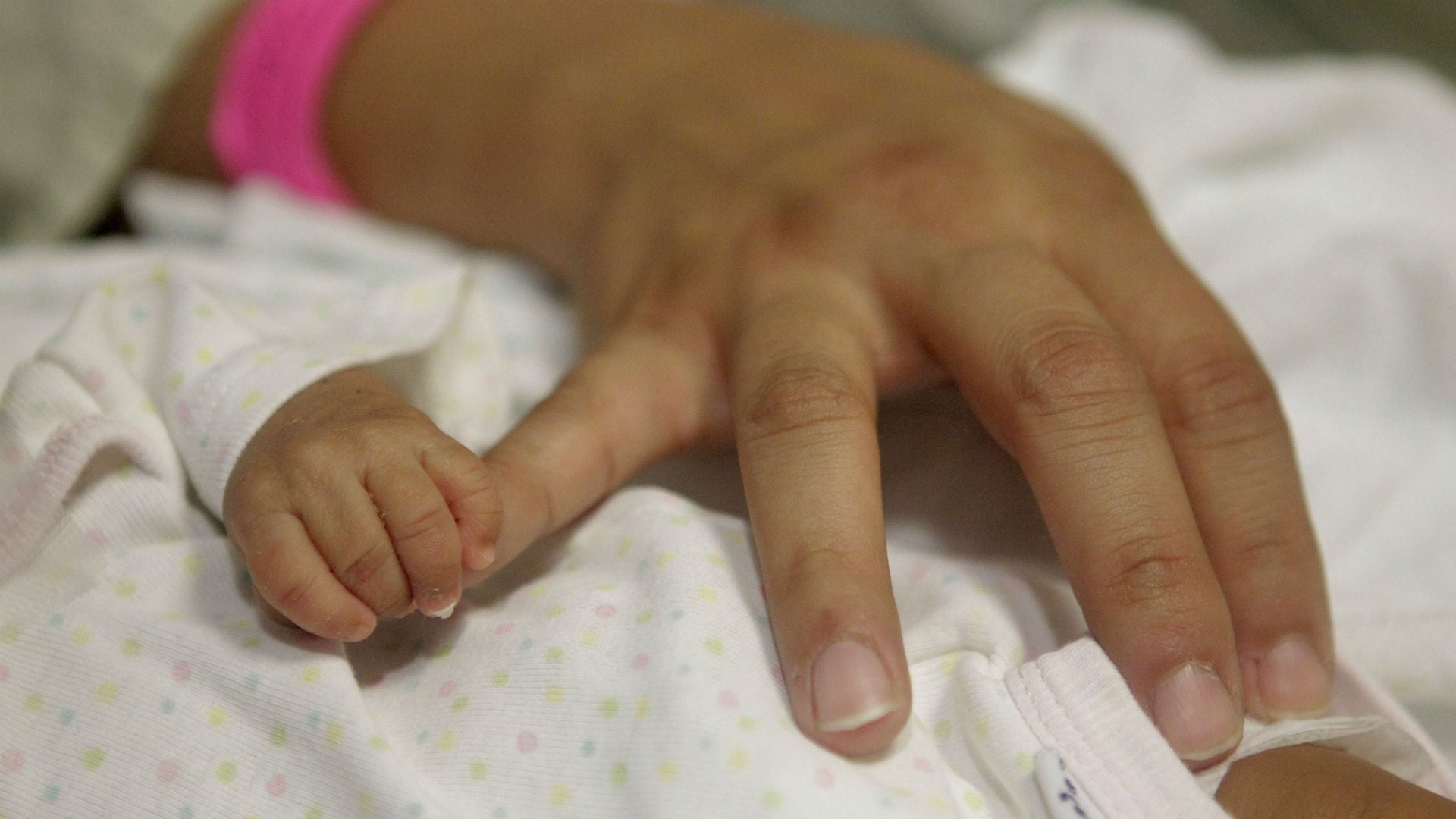

First comes love, then comes marriage, then comes … actually reverse that. First comes the baby, then, we’ll see.
For people who don’t have a college degree, having a child in wedlock has become the exception, not the rule. According to a new analysis presented at the Population Association of America, among parents aged 26 to 31 who didn’t graduate from college, 74% of the mothers and 70% of the fathers had at least one child outside of marriage. Even among mothers who had high school degrees or some college but no B.A., the majority of births occur among moms who are either single or cohabiting.
For the study, researchers examined the National Longitudinal Survey of Youth, which interviewed 9,000 young people born between 1981 and 1998 annually from 1997 to 2011. They found that the more education a mother has, the less likely she is to have a baby out of wedlock:
Of mothers with no high school diploma, 87% had at least one baby while unmarried.
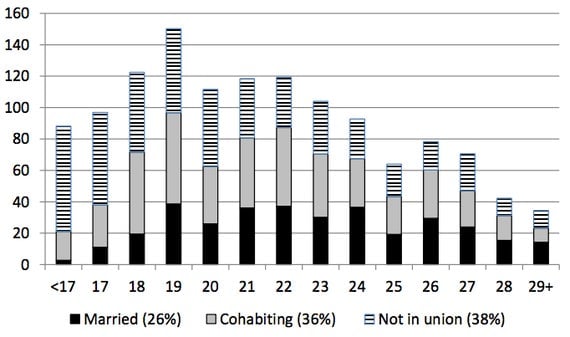
Of mothers with a high school diploma, 71% had at least one baby while unmarried.
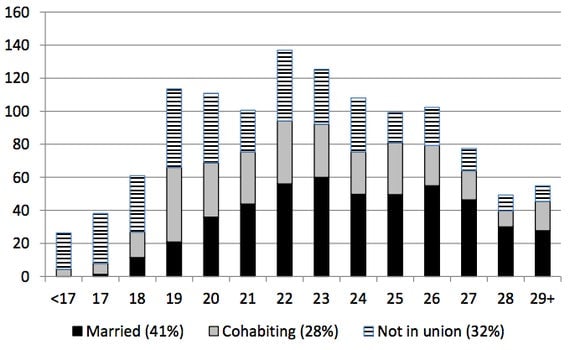
Of mothers with one to three years of college, 67% had at least one baby while unmarried.
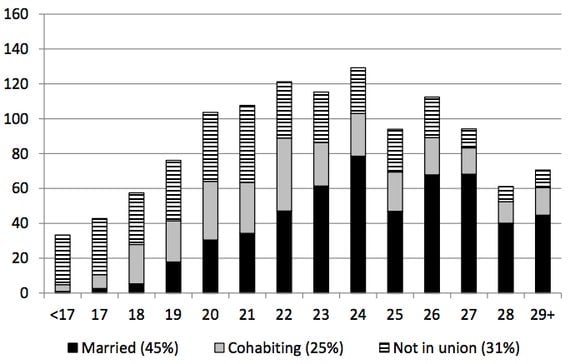
Of mothers with four or more years of college, 32% had at least one baby while unmarried.
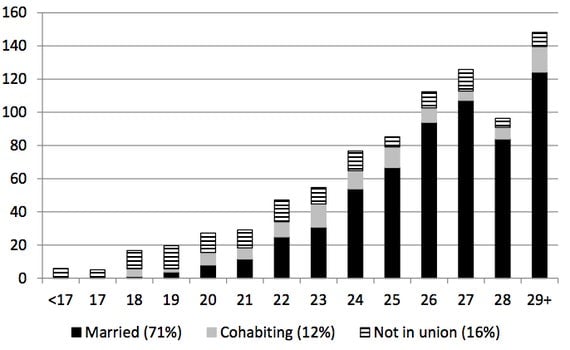
The less-educated mothers also tended to have their children younger. Women with B.A.s were most likely to have children at age 29 or 30, while those with high-school degrees had them at 22.
“The clear line is whether you have a four-year college degree,” the study’s lead author, Johns Hopkins sociologist Andrew Cherlin, told me. “There are two clear paths through adulthood—one for people who have a bachelor’s degree and one for people who don’t.”
There are several things going on here:
First, the cornerstone theory of marriage no longer applies
Culturally, young adults of all social classes and income levels are less likely to think of marriage as the “cornerstone” of their lives—that is, the first thing they do as adults. Instead, people now think of it as a “capstone”—sort of a trophy for having earned a B.A., obtained a job, and generally learned to live on their own for a while. The national marriage age has gradually ticked up as a result. For people who don’t have all the stones leading up to the capstone, though, the entire order of operations gets messed up.
Second, marriage is increasingly something only educated people do
As my former colleague Jordan Weissmann wrote, the less a man earns these days, the less likely he is to have ever been hitched. College-educated people are increasingly only marrying other college-educated people, and they’re more likely to get married overall. One reason less-educated women are having children out of wedlock is that college-educated men are not interested in marrying them.
“The college-educated young adults can see a good future, where they’re likely to find a good partner, pool two incomes, and they’re willing to wait to have kids till they can do that,” Cherlin said. Meanwhile, the less-educated women “don’t see the possibility of finding partners with good incomes. And many are unwilling to give up the opportunity to have a kid by waiting.”
Women without college degrees see a dearth of husband options around them
Incarceration rates are higher among the poor, and even low-income men tend to view marriage as something they should only do after they get a good job.
Even among less-educated couples who are living together, “the guys don’t think they’re good marriage material either,” Cherlin said. “Men think they need to be able to provide. They’ll say the love is there, the trust is there, everything is there except the money.”
It’s harder to plan when you’re poor
People without college degrees tend to be poorer, and poverty has been shown to tax the brain’s capacity for rational decision-making.
To a wealthy person, of course it doesn’t make sense for a high-school dropout to have a kid by herself. But as Maria Konnikova wrote in the New York Times this weekend, poverty actually robs you twice: First by making resources scarce, and second by making it harder for the poor to plan long-term. “The demands of the moment override the demands of the future, making that future harder to reach,” she writes.
Cherlin said these couples don’t not use birth control, but they don’t use it effectively either. The Affordable Care Act made birth control free, and that might make a difference, but only if people use their birth control correctly.
Having a baby can be a marker of adulthood
Finally, let’s say you don’t finish high school. Many of the higher-paying jobs you might have been eligible for 50 years ago have been outsourced or computerized, and the remaining jobs are low-paying and dull.
Meanwhile, babies are great; they’re like a little mini-job that you get to love. Plus, being a mother is being someone.
“Many young women think they will be able to care for the kid—they have a mother who can help, a sister they can rely on,” Cherlin said. Particularly among the very poorest Americans, “this is a way a woman or man can be a successful adult when all other paths are blocked.”
***
The plurality of the moms in the study who didn’t finish high school before having a kid (36%) are actually not single: They’re living with a boyfriend. And that would actually be okay, if those relationships were stable. The trouble is, they’re not.
Unlike in Western Europe, where couples cohabit for years and sometimes decades, often with kids, less-educated Americans tend to rotate in and out of cohabiting relationships as the years wear on. They have children with multiple different partners, creating complex webs of child obligations, step-parents, and half-siblings.
“One might say ‘who cares?’ [about the cohabitation],” Cherlin said. “In fact, the French don’t seem to care. Scandinavian people do the same thing. But our cohabiting relationships aren’t like theirs.”
“I’m not saying everyone has to be married, but it’s best for children if their parents are in stable relationships. It doesn’t have to be marriage, it doesn’t have to be two different genders. The problem is the instability of the kids’ lives as they live through all these comings and goings.”